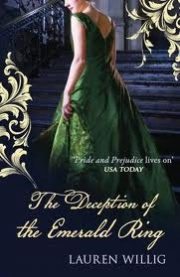A. I give you a whole rebellion to play with, and you claim there was no decent entertainment? There's just no pleasing some characters. And, no, Lord Vaughn, it couldn't have waited till December for the simple reason that the Irish Rising of 1803 occurred in July.
I first stumbled across the Rising of 1803 in 2002, in the midst of a bitter-cold Cambridge winter. At the time, I was an overeager third-year graduate student teaching a class on the Second British Empire (1783–1945), desperately trying to stay one step ahead of my students, all of whom seemed to know more about Ireland and India than I did. As I burned the midnight oil, reading up on rebellions and revolutions, murders and mutinies, I came upon one of Ireland's lesser-known risings: the tale of Robert Emmett and the Irish Rising of 1803. The Irish Rebellion had it all: hidden identities, smoky taverns, dark alleyways, secret negotiations with the French, smuggled explosives. I knew, then and there, that it had to form the backbone of my third book. Admittedly, at that point I still hadn't even finished my first book, and I had no idea when, if ever, I was going to make it all the way to a third, but the Irish Rebellion was just too perfect to miss out on.
Fate appeared to agree. When a good friend got married that spring, the postparty to the rehearsal dinner was held at a bar. As we approached, a wooden sign creaking in the May breeze caught my attention. An oddly familiar picture of a dapper man in white cravat and black frock coat, his hair cut short and combed forward over his forehead was painted on it. The name of the bar, of course, was Robert Emmett's. The rest, as they say, is history.
Q. I have been credibly informed that you have so sunk in your social station as to take a situation in a solicitor's office. I trust this ill-advised foray into employment will not result in any delinquency in the penning of my chronicles.
A. First of all, they're not your chronicles. It's the Pink Carnation series, not the Lord Vaughn Show. One trembles to think what the Lord Vaughn show might entail. No, please, don't tell me.
It is true that I have another life outside the Pink Carnation books, as an associate at a large New York law firm. It all happened in a rather roundabout way. Way back when, during my research year in London, it finally dawned on me that the academic job market is just as bad as everyone says. Since I didn't much fancy the idea of starving in a garret by the light of a single candle—and even decent garrets are pretty hard to come by these days—I fell back on the last refuge of the liberal arts major: law school. One month into law school, I got the call that every fledgling author dreams of: suddenly, I had a book contract and a legal career (and an unwritten dissertation, but I try not to think about that bit). Once I was getting that legal education, it seemed a waste not to put it to use. So here I am, associate by week, novelist by weekend.
Although the two may seem very different, I find that my day job as a lawyer and my weekend job as an author feed into each other nicely. On weekdays, I wake up at seven, put on my suit and pearls, traipse into the office, plunk myself down at a desk, and drink too much coffee. On weekends, I wake up at seven, put on ancient plaid pants and a shirt with holes in the seams, traipse across my living room, plunk myself down at a desk…and drink too much coffee. See?
On a more serious note, having a day job does have an unexpectedly beneficial impact on my writing, even aside from the ability to pay my rent (see garret, above). I've always found that one of the great drawbacks of the writing life is that, while one is purporting to purvey truths about humanity, one doesn't interact much with humanity. Dialogue and characterization become increasingly based upon other authors' fictional worlds rather than the actual ebb and flow of life beyond one's apartment doors. At the workplace, on the other hand, character quirks and overheard bits of dialogue are as plentiful as the coffee splotches on the pantry floor. Gainful employment also tends to increase efficiency. As a lawyer, I know that when something needs to be done, it needs to be done now. "But I'm waiting for my muse!" is never an acceptable answer someone is waiting for a document (which begs the interesting question: Is there a Muse of Legal Writing? And, if so, where has she been hiding all this time?). Since I have a very bad tendency to procrastinate when left to myself for long periods of time, being put through the professional equivalent of boot camp on the weekdays does wonderful things for my production of prose on the weekends.
Q. I find myself in want of a mistress. If one must continue in this series, one expects at the very least to be provided with the basic amenities.
A. My dear Lord Vaughn, I fear you mistake yourself. The proper phrase is "in want of a wife." Trust me. You shan't be in want of one for long. In fact, you may be getting a bit more than you bargained for there!


"The Deception of the Emerald Ring" отзывы
Отзывы читателей о книге "The Deception of the Emerald Ring". Читайте комментарии и мнения людей о произведении.
Понравилась книга? Поделитесь впечатлениями - оставьте Ваш отзыв и расскажите о книге "The Deception of the Emerald Ring" друзьям в соцсетях.